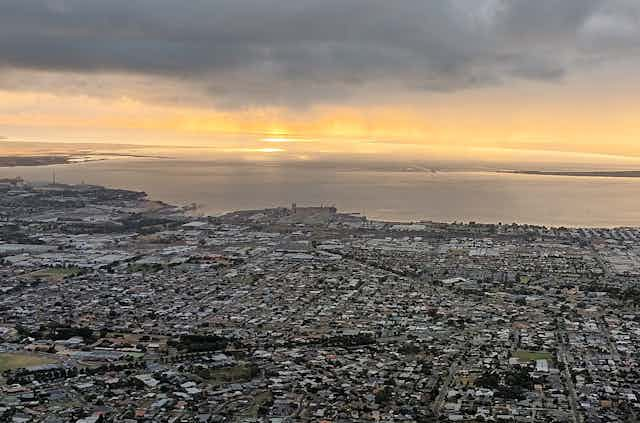While the federal government was announcing its flagship Net Zero Authority, in the Victorian city of Geelong hundreds of people – including community groups, unions, faith organisations and business representatives – were preparing an announcement of their own this week.
Over the past six months Geelong has hosted one of Australia’s largest ever local “listening campaigns” relating to the climate transition. It’s part of the University of Sydney’s Real Deal for Australia project. The aim is to give local communities a real say in the changes they’re facing.
A report on actions to be taken, based on community feedback, was launched on May 10.
So what can this policymaking experiment teach the Net Zero Authority about how to plan Australia’s climate transition?
One clear message is that housing and its role in this transition is an overwhelming concern. Housing quality and security, cost of living and climate change are all linked by the impacts of extreme weather, energy costs and emissions, and unequal access to solar power. Job security is similarly entwined with climate policy.
But if climate is presented as a separate issue disconnected from these other sources of stress in daily life, people withdraw and see action on climate as too much to bear.
Transition works best as a cooperative process

The idea of transition is not new to Geelong. The Pyramid Building Society collapse in 1990 and the closures of the Ford factory and Alcoa aluminium smelter in the 2010s brought about big changes. For many, those transitions were done “to” Geelong not “with” Geelong.
Climate change is bringing another transition. How can we ensure people are not left behind this time?
Community-led research is an approach that has gained currency in recent decades. The term covers a wide range of methods, all based on the principle that communities should be at the centre of any research or policy process that is about them. As an editorial in the journal Nature has said:
Knowledge generated in partnership with the public and policymakers is more likely to be useful to society.
Rather than treating people as the subjects of policy, this approach involves communities in designing policy. It asks everyday people to guide the research process. They shape the questions asked, the methods of engagement, the analysis of data and the creation of research and policy outcomes.
How does the Real Deal approach work?
The Sydney Policy Lab began the Real Deal for Australia project in 2019, following a period of divisive, polarised climate politics in Australia.
It aims to test whether community-driven policy solutions can provide an alternative strategy amid the uncertainties of the climate crisis. Real Deal projects have also begun in Western Sydney and the Queensland port city of Gladstone.
In the Real Deal approach, “relationships must precede action”. In practice, this process has involved building a network of national climate groups, unions and community organisations. Together, they have produced a distinctive approach to community-led research, outlined in a 2020 Real Deal Report.
Between September 2022 and March 2023, the Real Deal for Geelong team conducted 38 “table talks”. These small-group conversations were held in church halls, community centres, union meeting rooms and even a local pub. Achieving this level of participation wasn’t easy.
It makes time for communities to set the agenda and shape solutions that respond to their needs. In a world focused on quick outcomes, some Geelong leaders were sceptical about a drawn-out listening process. Engagement was complicated by post-lockdown exhaustion and interrupted by the Victorian state election and school holidays.
Despite the challenges, the power of this research involving 238 residents lay in how it was done. Local community members, supported by a team of researchers, led the process. It was unlike traditional “consultation” where so-called experts present pre-packaged policy solutions.

So what are the findings from Geelong?
The listening process found the path to net zero requires more than just creating new industries and new jobs. In Geelong, the biggest issue was anxiety about housing – 92% of participants mentioned it.
Housing was closely connected to climate. Poor housing stock, especially rental homes, was unable to handle increasingly erratic weather. There were stories of flooded homes after extreme weather events. The issue of mould alone was raised in 20% of the table talks. A participant from a local community service said:
In our organisation we have reports of substandard rental properties that experience leaks during extreme weather events and sewage coming up through plumbing as stormwater systems fail in older areas.
Housing is linked to both cost of living and climate change. For instance, people in rental homes couldn’t access cheaper, low-emissions electricity through rooftop solar systems.
Participants talked about a two-tier system: the wealthy could protect themselves with better homes, retrofitting and solar; the less well-off could not (as Tuesday’s federal budget recognised).
The listening process also unearthed the importance of good housing as a source of security in a time of uncertainty. As the climate changes, insecure, expensive, inaccessible, poor-quality housing adds to people’s fear and instability.
In addition to housing, jobs, cost of living and quality care services were seen as vital in the transition to net zero.
How policy is made matters
The findings offer a very useful lesson for the Net Zero Authority. When planning for climate transition was connected to the other daily pressures people face, participants felt more certain of their agency. They became more convinced transformative change was possible.
As Australia steps up its investment in the transition, Geelong’s experience shows it matters how policy is made. When communities have a role in shaping the course of change, climate action can reduce the stresses in their lives instead of adding to them.
Geelong has shown that local and regional community-led approaches can be a powerful way to produce more holistic, just and popular transition policies.

